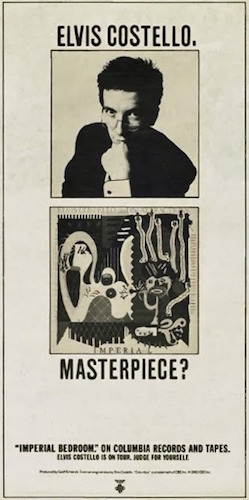
11.04.2016
ONE SONG: ELVIS COSTELLO’S ‘BEYOND BELIEF’
Washington City Paper: Chad Clark: November 2nd 2016
One Song is a new column by Chad Clark, of the band Beauty Pill, that dissects and interrogates the deeper meanings of a single song.
I am not much of a drinker. I’m what they call a lightweight. But I’ve found that there’s a certain state of mind I can only reach with alcohol.
It’s a kind of serene moment of discovered clarity. The world may sway and swish around you, but you’re in the perfect eye of the storm. It feels like lucidity. Perhaps intoxication has led you to revelation and balance?
It’s illusory, of course. A paradox.
In truth, alcohol serves to lower inhibition and impede motor function. Drinking is derangement. It turns you into a stumbling asshole or a stumbling sweetheart, depending on your disposition. It rarely leads to enlightened consciousness.
Elvis Costello’s “Beyond Belief” seems to be an impressionistic rendering of this chimerical vantage point. That epiphanic, philosophical insight that seizes you right before you slip off the bar stool.
The song is iconic among musicians; it provokes hushed awe in most songwriters I know. It evokes drunkenness sonically in order to parse drunkenness itself; a remarkable trick. But it goes deeper than that.
“Beyond Belief” is the concise and bold opening song of Elvis Costello & The Attractions’ album Imperial Bedroom. In 1982, this album came as a startling career departure. With his earlier releases, Costello had established a persona: a confrontational, snarling, acerbic punk. His songs were recriminatory, his recordings economical, dry, and punchy.
The lushly appointed, daringly ambitious Imperial Bedroom (produced by the brilliant Beatles engineer Geoff Emerick) was a total surprise. And coming as it does at the top of the album, “Beyond Belief” functions as Imperial Bedroom’s statement of intent. All opening songs purport to work that way, but “Beyond Belief” seems especially defiant.
The song drops you into a suspended, swirling reverie with a single bass note, a faint and floating organ sound, and a jazz-like drum rhythm that keeps the floor slipping beneath your feet. Most notably: There is no guitar. The music seems to hover and float mid-air. Nobody knew The Attractions could do this.
Into this ghostly space comes Costello’s voice, employing a gentle tone that seems either sultry or haunted, depending on your perspective. There is no precedent in his catalogue. It comes out of nowhere. As do the words:
History repeats the old conceits
the glib replies the same defeats
Keep your finger on important issues
with crocodile tears and a pocketful of tissues
I’m just the oily slick on the windup world with a nervous tick
in a very fashionable hovel
The lyrics spool out masterfully like lines from James Joyce or T.S. Eliot. Densely packed with shadowy wordplay and phantasmagoric allusion, the song seems to depict a sinister night in a bar (or “gin palace.”) Ostensibly, the song’s subject attempts to seduce a beautiful woman. He feels a predatory mixture of desire and objectifying contempt for her. He admires her innocence, but also wishes to defile it. He’s drawn to her allure, but also resents it. We’ve all seen men do this.
The subject seems to be getting progressively inebriated as the song moves forward. Though it begins with a languid tempo, “Beyond Belief” ends at almost double speed. The pace feels desolate. There is a suggestion of existential panic and harrowing hallucination. (Why the San Andreas fault? Why the canals of Mars?)
The last few lines, which are repeated into the fade-out, express this dread most explicitly. And the fade-out happens just as the band surges most fiercely. The Attractions’ drummer Pete Thomas, in particular, is at his most fiery as the song drifts away. No accident.
But to me, the most striking and singular element of “Beyond Belief” is the melody.
The melody never repeats until the very last line of the song forms a dark, looping refrain. Pop music is founded on hooks: repeated motifs that are meant to grab you. Making a pop song without repeating a melody… well, I wouldn’t recommend it.
Local painter and songwriter Ryan Nelson (of the bands Soccer Team and Minutes) describes Costello’s lilting melody as “a spiral staircase.” I’d never thought of it that way, but it does have a helix-like quality.
Ryan teaches English and he brought some of his professional literary insight to bear on the discussion. We sifted through the wordplay and homonym gems strewn throughout the lyrics. “In a sense” sounds a lot like “innocence.” Both “nervous tick” and “nervous tic” work in context. And of course the sequence of “catcall,” “wolfwhistle,” and “dogfight” has to be deliberate. Ryan even clued me into “rose and thistle,” symbolizing tension between the English and Scottish cultures, respectively.
Amid the current controversy over whether a songwriter is worthy of recognition among the pantheon of Serious Literature, “Beyond Belief” is certainly as good an exemplar for The Pop Song As High Art as any. It seemed a fitting inaugural topic for this series.